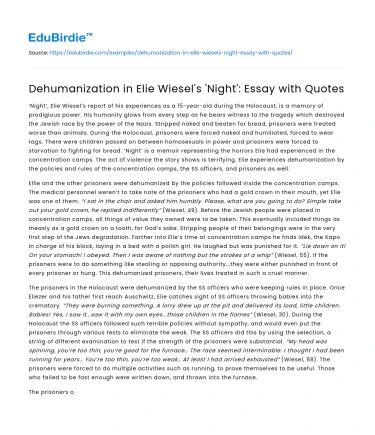‘Night’, Elie Wiesel’s report of his experiences as a 15-year-old during the Holocaust, is a memory of prodigious power. His humanity glows from every step as he bears witness to the tragedy which destroyed the Jewish race by the power of the Nazis. Stripped naked and beaten for bread, prisoners were treated worse than animals. During the Holocaust, prisoners were forced naked and humiliated, forced to wear rags. There were children passed on between homosexuals in power and prisoners were forced to starvation to fighting for bread. ‘Night’ is a memoir representing the horrors Elie had experienced in the concentration camps. The act of violence the story shows is terrifying. Elie experiences dehumanization by the policies and rules of the concentration camps, the SS officers, and prisoners as well.
Ellie and the other prisoners were dehumanized by the policies followed inside the concentration camps. The medical personnel weren’t to take note of the prisoners who had a gold crown in their mouth, yet Elie was one of them. “I sat in the chair and asked him humbly. Please, what are you going to do? Simple take out your gold crown, he replied indifferently” (Wiesel, 49). Before the Jewish people were placed in concentration camps, all things of value they owned were to be taken. This eventually included things as measly as a gold crown on a tooth, for God’s sake. Stripping people of their belongings were in the very first step of the Jews degradation. Farther into Elie’s time at concentration camps he finds Idek, the Kapo in charge of his block, laying in a bed with a polish girl. He laughed but was punished for it. “Lie down on it! On your stomach! I obeyed. Then I was aware of nothing but the strokes of a whip” (Wiesel, 55). If the prisoners were to do something like stealing or opposing authority...they were either punished in front of every prisoner or hung. This dehumanized prisoners, their lives treated in such a cruel manner.
Save your time!
We can take care of your essay
- Proper editing and formatting
- Free revision, title page, and bibliography
- Flexible prices and money-back guarantee
The prisoners in the Holocaust were dehumanized by the SS officers who were keeping rules in place. Once Eliezer and his father first reach Auschwitz, Elie catches sight of SS officers throwing babies into the crematory. “They were burning something. A lorry drew up at the pit and delivered its load, little children. Babies! Yes, I saw it...saw it with my own eyes...those children in the flames” (Wiesel, 30). During the Holocaust the SS officers followed such terrible policies without sympathy, and would even put the prisoners through various tests to eliminate the weak. The SS officers did this by using the selection, a string of different examination to test if the strength of the prisoners were substantial. “My head was spinning, you’re too thin, you’re good for the furnace… The race seemed interminable. I thought I had been running for years… You’re too thin, you’re too weak… At least I had arrived exhausted” (Wiesel, 68). The prisoners were forced to do multiple activities such as running, to prove themselves to be useful. Those who failed to be fast enough were written down, and thrown into the furnace.
The prisoners of the Holocaust were dehumanized by everyone around them, including themselves. Again, if prisoners were to break the rules of the concentration camp, they were to be hung. During one of these hanging ceremonies, Elie’s friend inmate complained. “Do you think this ceremony will be over soon? I’m hungry…” (Wiesel, 59). The dialogue proves the disinterest prisoners would show to something as horrible as a hanging. They were more concerned with their own ration of food than that person’s life. To treat others with less importance than something simple is terrifying. It becomes worse when the prisoners are being transferred to a different camp, and fight over bites of bread. “One day when we had stopped, a workman took a piece of bread out of this bag and threw it into a wagon. There was a stampede. Dozens of starving men fought each other to the death for a few crumbs. The German workmen took a lively interest in the spectacle” (Wiesel, 95). The prisoners had beat each other for bread. A prisoner’s son beat his father for bread to the point of death! Afterward, the son then died himself. To think that people were driven to such a long time of inhumanity, and to treat everyone else as if they’re in your way is saddening.
The prisoners of the Holocaust were dehumanized every step they took. The policies of the concentration camp, the SS officers, and even each other. Still, the Holocaust proves the true power humans hold and how it can shape identity. Whether it be through violence or keeping your friends close, the will of survival had fueled the prisoners’ instinct. The Holocaust is a tragedy that tested to what lengths humankind will end up to, even with morals thrown to the can.






 Stuck on your essay?
Stuck on your essay?

